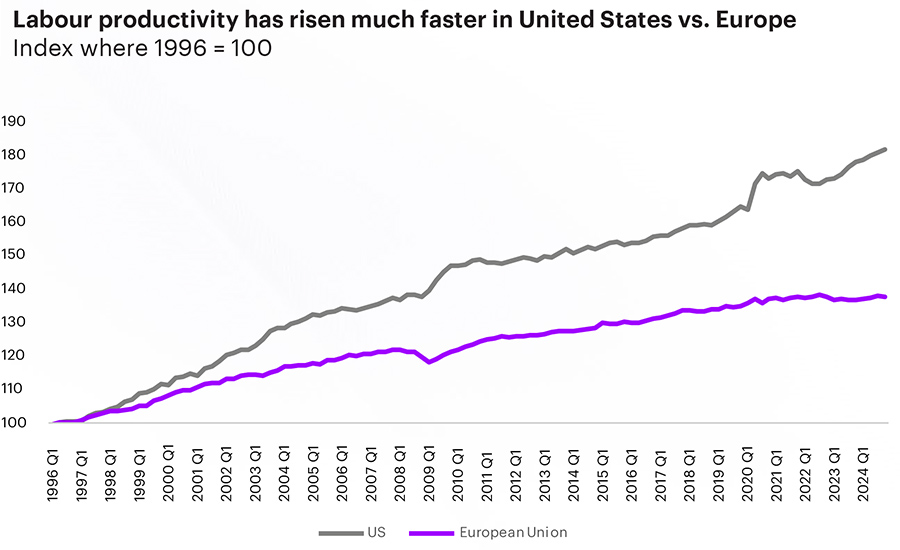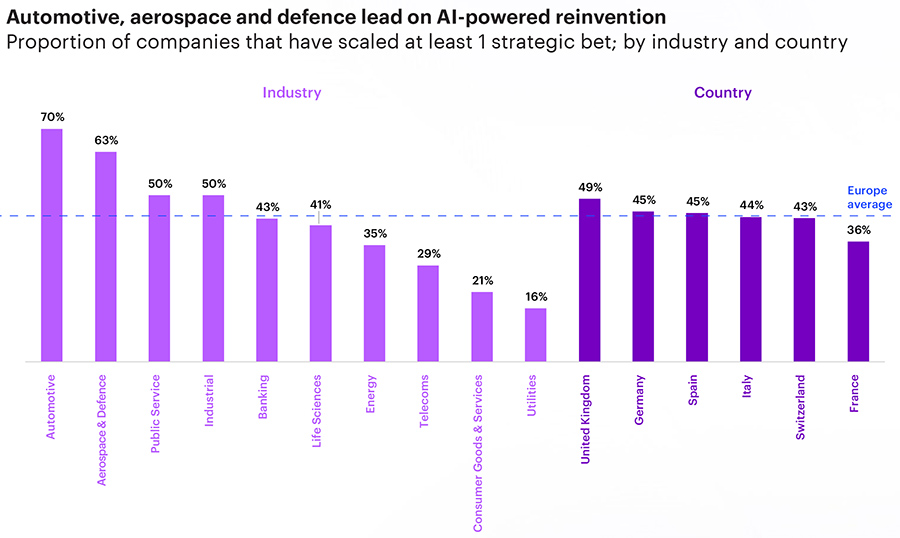
Amid the current geopolitical and economic uncertainty that has characterised 2025, Europe needs to plan for a future where it can sustain itself without leaning on the US or China. However, a new whitepaper from Accenture argues that the continent is lagging behind on AI adoption, and that this is exacerbating the region’s long-standing productivity gap.
Around the world, executives of every industry remain excited around AI. Particularly, they are hopeful of the productivity boosts and efficiency savings it can yield, which could enable their businesses to expand in new directions. But the best part of three years since ChatGPT and generative AI entered the public conscious, the areas where leaders expect best returns seems to be shifting.
A recent study from IBM polled an international cohort of CEOs, and found that even as talk of the technology’s untapped possibilities remains rife, progress in the adoption of AI remains slow. As a result, a growing number of global respondents said they were shifting from expecting AI could boost growth, and instead prioritising its ability to find savings.

Source: Accenture Research
But amid this shift, a new study from Accenture suggests that by bucking this trend, Europe could in fact find opportunities to gain ground on the world’s other largest regional economies. According to the consultants, the average European worker now produces only 76% as much as their US counterparts, a significant decline from being on par 30 years ago, with persistent underinvestment in technology identified as a major cause.
Minding the gap
While the researchers concede that “AI is not a silver bullet”, and that it cannot “directly solve perennial issues such as regulatory complexity”, or shield European companies from “rising trade barriers or subsequent market uncertainty”, they argue it can be “a powerful tool – helping organisations… make smarter decisions and improve forecasting and real-time analytics”.
Mauro Macchi, CEO of Accenture in EMEA, commented, “At a time when geopolitical uncertainties are on the rise, finding a solution to Europe’s productivity gap has never been more crucial. AI provides a unique opportunity for Europe to reinvent its economy and significantly boost its competitiveness.”
The report identifies key capabilities, from data to talent, that companies need to drive value from AI investments. According to Accenture, these AI capabilities are well spread across countries, with Switzerland, Germany, the UK and France, on average, home to slightly more AI-ready companies, than Italy and Spain. But despite this relatively stable starting point, AI adoption across the continent has been slow,

Source: Accenture Research
Low investment
Currently 56% of the 800 large European companies surveyed have yet to scale a major AI investment. But the analysts believe that if all large European companies worth more than €1 billion enhanced their AI capabilities to match those of leading industries, almost €200 billion could be added to annual business revenues. To make this a reality, the firm recommends looking to the best practices of industries which have been quickest to adopt AI. Some sectors such as automotive, aerospace and defence are leading the way.
In automotive, for example, 70% of companies have scaled at least one strategic bet, with most focused on enhancing product design and customer engagement. Aerospace and defence follows at 63%, with companies focusing mostly on improving simulations – including crash tests and aerodynamics – and providing in-use data analysis. In stark contrast, only 16% of utilities companies have scaled bets to improve processes such as generation forecasting and proactive maintenance.
Macchi added, “European firms are making progress but need to further leverage cloud, modernise data architecture and focus on skilling in order to scale AI faster and unleash its full potential. A coordinated industrial strategy, including shared AI infrastructure and investments will also avoid dispersion of initiatives and help businesses across all European countries access powerful computing, R&D, and training. Europe has all it needs to take advantage of the AI revolution. Now is the time to execute on it.”
